
‘Live’ Bullet is a live album by American rock band Bob Seger & the Silver Bullet Band, released in April 1976. It was recorded at Cobo Hall in Detroit, Michigan, during the heyday of that arena's time as an important rock concert venue. The album is credited, along with Night Moves, with launching Seger's mainstream popularity.

Robert Clark Seger is a retired American singer, songwriter, and musician. As a locally successful Detroit-area artist, he performed and recorded as Bob Seger and the Last Heard and the Bob Seger System throughout the 1960s, breaking through with his first album, Ramblin' Gamblin' Man in 1969. By the early 1970s, he had dropped the 'System' from his recordings and continued to strive for broader success with various other bands. In 1973, he put together the Silver Bullet Band, with a group of Detroit-area musicians, with whom he became most successful on the national level with the album Live Bullet (1976), recorded live with the Silver Bullet Band in 1975 at Cobo Hall in Detroit, Michigan. In 1976, he achieved a national breakout with the studio album Night Moves. On his studio albums, he also worked extensively with the Alabama-based Muscle Shoals Rhythm Section, which appeared on several of Seger's best-selling singles and albums.

Mongrel is the third studio album by American rock band the Bob Seger System, released in 1970. During its four-week run on the Billboard 200 chart, the album entered the chart at the end of October 1970, then rose to number 171 two weeks later.

Back in '72 is the sixth studio album by American rock singer-songwriter Bob Seger, released in 1973. It was the first new album on Seger's manager Punch Andrews' label, Palladium Records, to be released under their distribution deal with the Reprise division of Warner Bros. Records and one of three early Seger albums that has never been reissued on CD.

Seven is the seventh studio album by American rock singer-songwriter Bob Seger, released in 1974.

Night Moves is the ninth studio album by American rock singer-songwriter Bob Seger, and his first studio album to credit the Silver Bullet Band. The album was released by Capitol Records on October 22, 1976. Although the front cover only credits backing by the Silver Bullet Band, four of the nine songs on the album feature backing by the Muscle Shoals Rhythm Section.

Stranger in Town is the tenth studio album by American rock singer Bob Seger and his second with the Silver Bullet Band, released by Capitol Records in May 1978. As with its predecessor, the Silver Bullet Band backed Seger on about half of the songs and the Muscle Shoals Rhythm Section backed Seger on the other half.
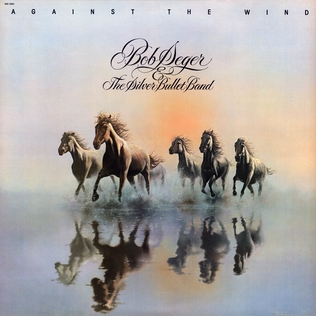
Against the Wind is the eleventh studio album by American rock singer Bob Seger and his fourth which credits the Silver Bullet Band. Like many of his albums, about half of the tracks feature the Muscle Shoals Rhythm Section as backing musicians. It was released in February 1980. It is Seger's only number-one album to date, spending six weeks at the top of the Billboard Top LPs chart, knocking Pink Floyd's The Wall from the top spot. Seger said that the album "is about trying to move ahead, keeping your sanity and integrity at the same time."

Nine Tonight is a live album by American rock band Bob Seger & The Silver Bullet Band, released in 1981. The album was recorded at Cobo Hall in Detroit, Michigan, in June 1980 and at the Boston Garden in Boston, Massachusetts in October 1980. With the exception of three tracks — "Nine Tonight", "Tryin' To Live My Life Without You" and "Let It Rock" — the album is composed entirely of songs drawn from Seger's three previous studio albums. Only "Let It Rock" was repeated from the previous live album Live Bullet. "Tryin' to Live My Life Without You" was released as a single and peaked at number five on the Billboard Hot 100 in the US. The album's title track was originally recorded for the Urban Cowboy soundtrack album.
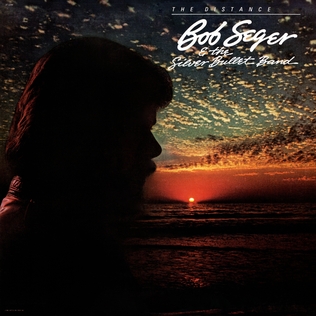
The Distance is the twelfth studio album by US-American rock singer Bob Seger. It was released in the final week of 1982. It peaked at #5 on Billboard's album chart and sold close to two million copies in the United States.

Like a Rock is the thirteenth studio album by American singer-songwriter Bob Seger, released in 1986. The title track is best known for being featured in Chevrolet truck commercials throughout the 1990s and early 2000s.

The Fire Inside is the fourteenth studio album by American singer-songwriter Bob Seger. The album was released in mid 1991 on the record label, Capitol. It was Seger's first album of entirely new music since Like a Rock in 1986. Though credited to "The Silver Bullet Band", much of the album used guest and session musicians, with limited contributions from Silver Bullet Band members. Among the guest artists on the album are Joe Walsh, Bruce Hornsby, Roy Bittan, Steve Lukather, Don Was, Waddy Wachtel, Rick Vito, Mike Campbell, Patty Smyth, Lisa Germano, and Kenny Aronoff.

Greatest Hits is a compilation album by Bob Seger & the Silver Bullet Band, released in 1994. Certified Diamond by the RIAA, it is Seger's most successful album to date. In December 2009, Billboard and Nielsen SoundScan confirmed that with nearly nine million copies sold. Bob Seger's Greatest Hits was the decade's best-selling catalog album in the United States, even out-selling The Beatles' 1 and Michael Jackson's Number Ones. By September 2011, the album had sold a total of 9,062,000 copies in the United States.
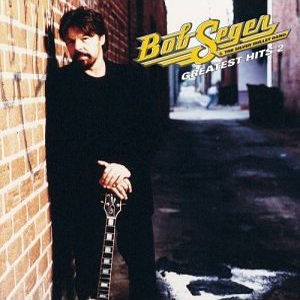
Greatest Hits 2 is a compilation album by Bob Seger, released in 2003.

"Old Time Rock and Roll" is a song written by George Jackson and Thomas E. Jones III, with uncredited lyrics by Bob Seger. It was recorded by Seger for his tenth studio album Stranger in Town. It was also released as a single in 1979. It is a sentimentalized look back at the music of the original rock 'n' roll era and has often been referenced as Seger's favorite song. The song gained renewed popularity after being featured in the 1983 film Risky Business. It has since become a standard in popular music and was ranked number two on the Amusement & Music Operators Association's survey of the Top 40 Jukebox Singles of All Time in 1996. It was also listed as one of the Songs of the Century in 2001 and ranked No. 100 in the American Film Institute's 100 Years...100 Songs poll in 2004 of the top songs in American cinema.
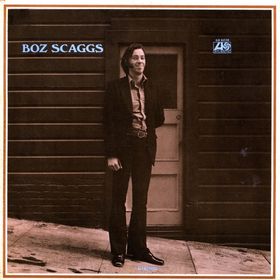
Boz Scaggs is the second studio album by American musician Boz Scaggs, released in 1969 by Atlantic Records. A stylistically diverse album, Boz Scaggs incorporates several genres, including Americana, blue-eyed soul, country, and rhythm and blues. The lyrics are about typical themes found in blues songs, such as love, regret, guilt, and loss. Scaggs recorded the album at Muscle Shoals Sound Studio with producer Jann Wenner, the co-founder of Rolling Stone magazine. The Muscle Shoals Rhythm Section heavily contributed to the album, which included a young Duane Allman, before his rise to fame with the Allman Brothers Band.
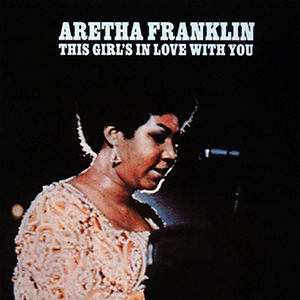
This Girl's in Love with You is the sixteenth studio album by American singer Aretha Franklin, released on January 15, 1970 by Atlantic Records. It reached Billboard's Top 20 and was reissued on compact disc through Rhino Records in 1993. Her version of The Beatles' "Let It Be" was the first recording of the song to be commercially issued. Songwriter Paul McCartney sent Franklin and Atlantic Records a demo of the song as a guide.
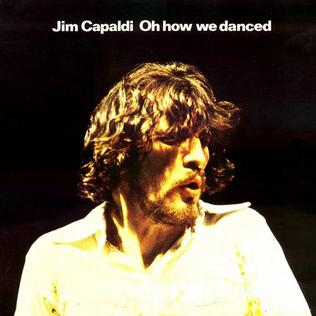
Oh How We Danced is the debut studio album by the British musician Jim Capaldi. The album was recorded while Traffic was on hiatus due to Steve Winwood's struggles with peritonitis and was released by Island Records in 1972. Like his contemporary albums with Traffic, it was unsuccessful in his native United Kingdom but did better in the United States, reaching number 82 in the Billboard 200 chart and producing the hit single "Eve", which reached number 91 in the Billboard Hot 100.

"Rock and Roll Never Forgets" is a song written by American singer-songwriter Bob Seger. The song first appeared on Seger's ninth studio album Night Moves (1976). The song was released in early 1977 as the third and final single from the album. The song peaked at No. 41 on the Billboard Hot 100, charting less successfully than the previous two singles. Nevertheless, "Rock and Roll Never Forgets" remains popular with Seger fans, and has become a staple of classic rock radio.

"American Storm" is a song written by American singer-songwriter Bob Seger. It was recorded with The Silver Bullet Band and released in March 1986 as the lead single from their album Like a Rock. The single peaked at number 13 on the U.S. Billboard Hot 100 chart and at number 2 on the US Billboard Mainstream Rock Tracks chart.




















